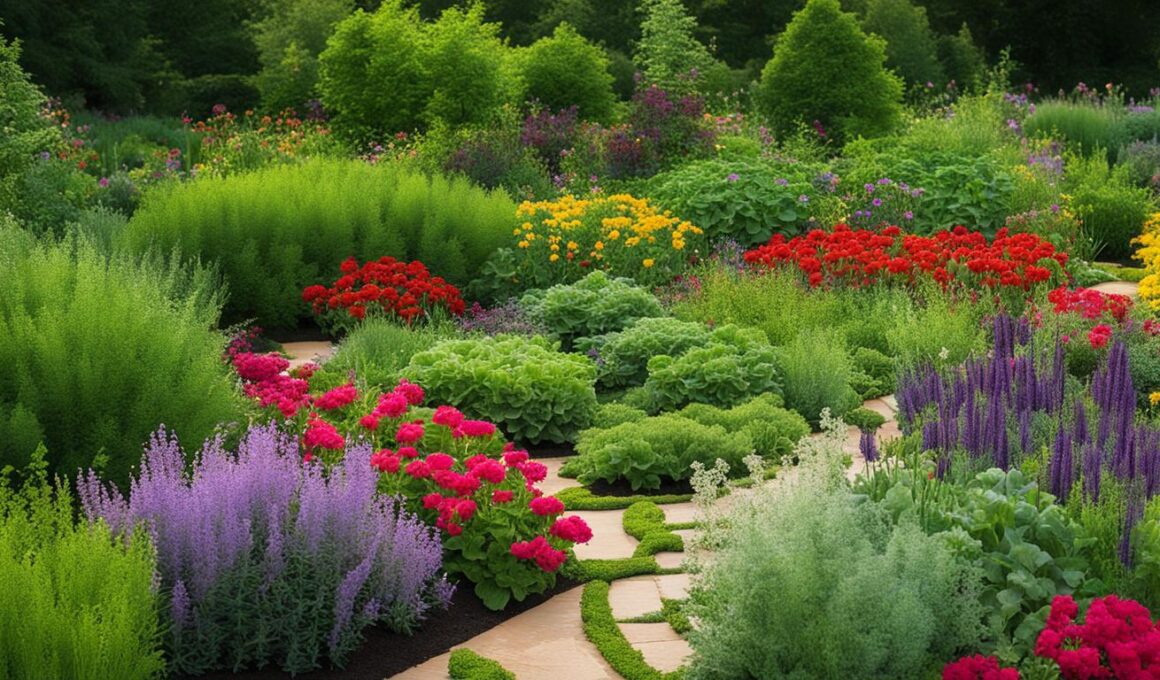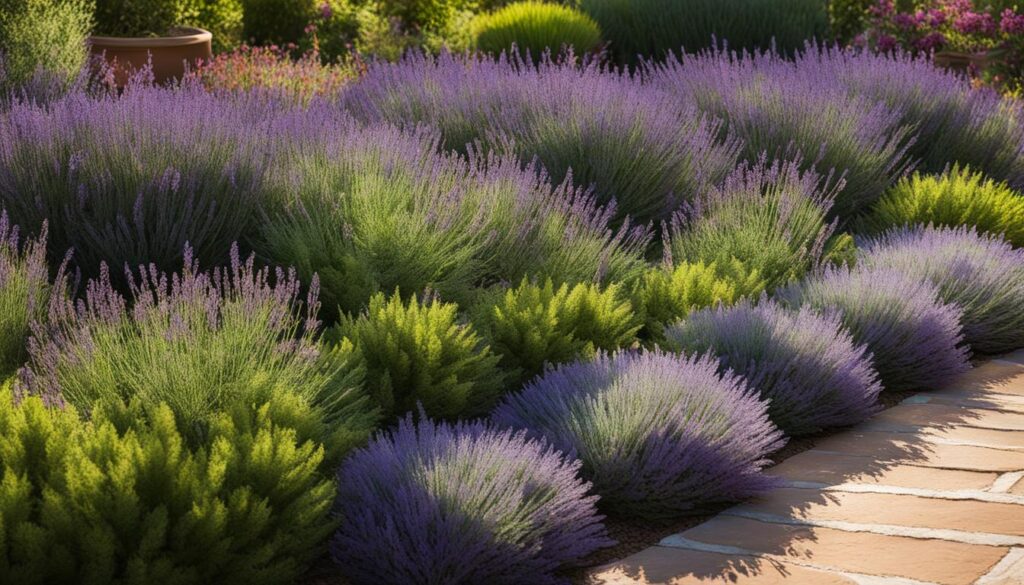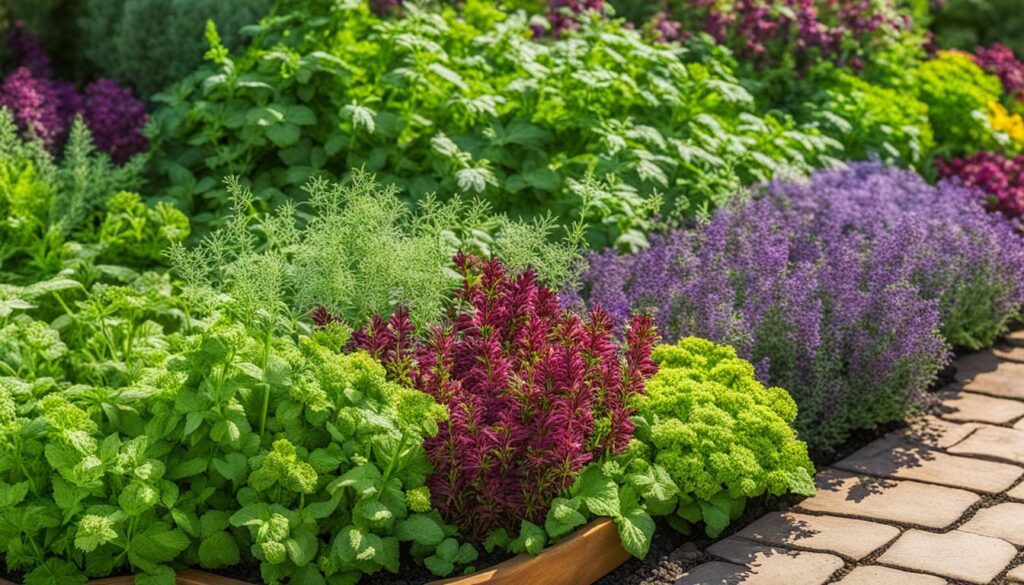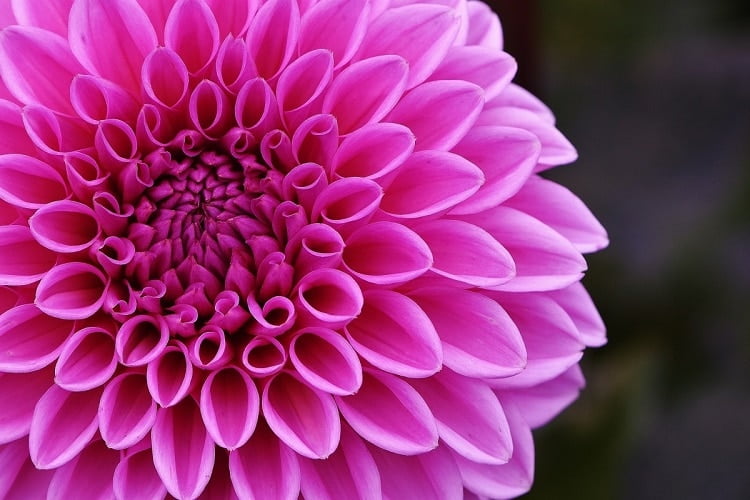Herbs are not only visually appealing in a garden but also have both culinary and medicinal uses. To ensure the success of herb gardening, it is important to know what herbs should be planted together. Companion planting is a practice where certain plants are grown together because they complement each other during their growing stages. This technique offers several benefits, including natural pest control, improved soil fertility, attraction of beneficial bugs and pollinators, greater yields, and reduced plant diseases. Companion planting can be practiced with flowers, vegetables, and herbs. By understanding which herbs should be planted together, you can enhance the health and vitality of your herb garden.
Key Takeaways:
- Companion planting is a valuable practice for creating a thriving herb garden.
- Strategically planting herbs together can provide natural pest control and improved soil fertility.
- Attracting beneficial bugs and pollinators can lead to greater yields and reduced plant diseases.
- Understanding compatibility between herbs is essential for a harmonious herb garden.
- Consider care requirements and recommended pairings when planning your companion plantings.
Pairings for Healthier Plants: Mediterranean Herbs and More
Mediterranean herbs such as oregano, basil, and tarragon are not only flavorful additions to your herb garden, but they also make excellent companions for each other. These herbs share similar growing requirements and can work together to promote healthier plants. Additionally, they offer natural pest control benefits, particularly in repelling pests like aphids.
By planting oregano alongside basil and tarragon, you can create a symbiotic relationship that deters aphids, which are particularly attracted to basil and tarragon. Oregano’s pungent, peppery aroma acts as a natural repellent, helping to keep aphids at bay. This companion planting technique can help protect your vulnerable herbs from pest infestations.
Furthermore, incorporating lemon verbena, dill, and cilantro into your herb garden can attract beneficial bugs that prey on common garden pests. For example, ladybugs are attracted to dill and cilantro, and their larvae feed on spider mites, aphids, and beetles. Tachinid flies, which consume caterpillars, are also lured by the presence of dill. By pairing these herbs together, you can create a diverse ecosystem that promotes natural pest control and the overall health of your plants.
| Herb | Companion Herbs | Pest Control Benefits |
|---|---|---|
| Oregano | Basil, Tarragon | Repels aphids |
| Dill | Lemon Verbena, Cilantro | Attracts ladybugs and tachinid flies, which consume pests like spider mites, aphids, beetles, and caterpillars |
With these Mediterranean herbs and their compatible companions, you can create a thriving herb garden while naturally deterring pests. Remember to consider the specific care requirements for each herb and provide them with adequate sunlight and water to ensure their optimal growth and vitality.
Potent and Compatible: Lavender, Rosemary, and Thyme
Lavender, rosemary, and thyme are three herbs that thrive when planted together due to their similar growing conditions. These herbs prefer ample sunlight and weekly watering, making them compatible companions in the garden. Not only do they share growing requirements, but they also possess bug-repellent properties, providing natural protection against common garden pests.
Lavender, with its fragrant purple flowers, acts as a natural deterrent against moths, fleas, and mosquitoes. Its aroma is pleasing to humans but repels insects. Rosemary, with its needle-like leaves and distinct fragrance, is known to repel pests like mosquitoes, flies, and beetles. Additionally, rosemary can attract beneficial insects such as bees and butterflies, which aid in pollination.
Thyme, with its small leaves and delicate purple or pink flowers, is an excellent companion to lavender and rosemary. It not only enhances the flavor profiles of dishes when combined but also acts as a potent bug repellent. Thyme wards off pests like cabbage worms, whiteflies, and aphids, safeguarding the health of the entire herb garden.
Combining lavender, rosemary, and thyme in your herb garden not only creates a visually appealing display but also provides a natural defense against pest infestations. These herbs work together harmoniously, benefiting from each other’s bug-repellent properties and similar care requirements. With their compatibility and potency, lavender, rosemary, and thyme are an ideal trio for a thriving herb garden.
| Herb | Growing Conditions | Bug Repellent Properties |
|---|---|---|
| Lavender | Ample sunlight and weekly watering | Repels moths, fleas, and mosquitoes |
| Rosemary | Ample sunlight and weekly watering | Repels mosquitoes, flies, and beetles |
| Thyme | Ample sunlight and weekly watering | Wards off cabbage worms, whiteflies, and aphids |
Versatile Pairings: Parsley and More
When it comes to companion planting in your herb garden, parsley is a versatile herb that pairs well with a variety of other herbs. Not only does parsley complement the flavors of sage and chives, but it also offers several other potential pairings to enhance your herb garden. Pairing herbs together can provide numerous benefits, such as improved pest control and healthier plant growth.
Compatible Pairings for Parsley
When planning your herb garden, consider pairing parsley with other herbs that have similar care requirements. Rosemary, thyme, lemon balm, lavender, and basil are all excellent options for companion planting with parsley. These herbs share similar sun and water requirements, making them ideal companions for your parsley plants. By planting these herbs together, you can create a visually appealing and aromatic garden while benefiting from their combined properties.
Avoiding Aggressive Growth Patterns
While parsley can be paired with a wide range of herbs, it’s important to avoid plants with aggressive growth patterns, such as mints. Mint varieties, known for their invasive nature, can quickly overtake other herbs in the garden and hinder the growth of parsley. To maintain a healthy and balanced herb garden, it’s best to keep parsley separate from aggressive herbs like mints.
| Herb | Companion Planting Benefits |
|---|---|
| Sage | Complements the flavors of parsley, adds diversity to herb garden |
| Chives | Enhances the aromatic quality of the garden, repels pests |
| Rosemary | Similar care requirements, adds fragrance to the garden |
| Thyme | Shares growing conditions with parsley, repels bugs and worms |
| Lemon Balm | Attracts beneficial insects, repels pests |
| Lavender | Similar sun and water requirements, enhances bug-repellent properties of the garden |
| Basil | Complements the flavors of parsley, offers a diverse range of culinary uses |
By choosing the right companion plants for parsley and considering care requirements, you can create a harmonious herb garden that promotes both the growth and flavor of your herbs. Take advantage of the versatility of parsley and explore the endless possibilities of companion planting in your garden.
Can I Use the Herbs Planting Together Guide to Create a Successful Garden?
Yes, the herbs that plant well together guide can definitely help you create a successful garden. By planting herbs that are compatible in terms of light, water, and soil requirements, you can promote healthier growth and increase your garden’s overall productivity.
Conclusion
Companion planting is a valuable practice for creating a thriving herb garden. By strategically planting herbs together, you can benefit from natural pest control, improved soil fertility, attraction of beneficial bugs and pollinators, greater yields, and reduced plant diseases. Understanding compatibility between herbs is essential to ensure the health and vitality of your garden.
By following the recommended pairings and considering care requirements, you can create a harmonious environment that promotes the growth and well-being of your herbs. With the right companion plantings, you can achieve a flourishing herb garden and enjoy the beauty and culinary benefits of herbs for seasons to come.
Remember to implement these planting tips and gardening advice to ensure healthier plants in your herb garden. Happy gardening!
FAQ
What is companion planting?
Companion planting is a practice where certain plants are grown together because they complement each other during their growing stages. This technique offers several benefits, including natural pest control, improved soil fertility, attraction of beneficial bugs and pollinators, greater yields, and reduced plant diseases.
Can companion planting be practiced with herbs?
Yes, companion planting can be practiced with flowers, vegetables, and herbs. By understanding which herbs should be planted together, gardeners can enhance the health and vitality of their herb gardens.
Which Mediterranean herbs pair well together?
Mediterranean herbs such as oregano, basil, and tarragon tend to pair well together due to their similar growing requirements. These herbs can help prevent pests like aphids, which are particularly attracted to basil and tarragon. Oregano’s peppery potency deters aphids, making it an excellent companion for these vulnerable herbs.
Are there any herbs that repel bugs and worms?
Lavender, rosemary, and thyme are three herbs that can be planted together due to their similar growing conditions. These herbs require ample sunlight and weekly watering. They also possess bug-repellent properties, protecting other herbs in the garden from pest infestations. Rosemary and thyme are particularly effective in repelling bugs and worms.
What herbs can be paired with parsley?
Parsley is a versatile herb that can be paired with a variety of other herbs. It complements flavors of sage and chives, making them excellent choices for companion planting. Other potential pairings for parsley include rosemary, thyme, lemon balm, lavender, and basil. However, it is important to separate parsley from herbs with aggressive growth patterns, such as mints.
How can I ensure the success of companion planting?
When planning companion plantings, it’s crucial to consider care requirements, including irrigation and sunlight conditions. By following the recommended pairings and considering these factors, gardeners can create a harmonious environment that promotes the growth and well-being of their herbs.











